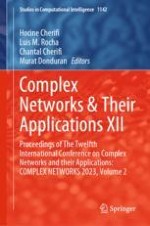2024 | OriginalPaper | Buchkapitel
Does Isolating High-Modularity Communities Prevent Cascading Failure?
verfasst von : Stephen Eubank
Erschienen in: Complex Networks & Their Applications XII
Verlag: Springer Nature Switzerland
Aktivieren Sie unsere intelligente Suche, um passende Fachinhalte oder Patente zu finden.
Wählen Sie Textabschnitte aus um mit Künstlicher Intelligenz passenden Patente zu finden. powered by
Markieren Sie Textabschnitte, um KI-gestützt weitere passende Inhalte zu finden. powered by
